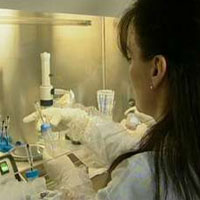Women in science (as seen on TV)
An EU project is offering television scriptwriters grants of EUR 7,000 to develop ideas for TV series or feature-length TV films featuring women in leading roles in science, engineering and technology. The aim of EuroWistdom (European Women in science TV Drama on Message) is to increase the attractiveness of science and engineering careers for women. 'Europe needs more scientists and engineers,' says Andrew Millington, one of the partners in the project. 'Half of the population is made up of women, so it makes sense to take advantage of this huge pool of potential talent.' In some European countries, science is still seen as a male reserve. Mr Millington believes that this is because these countries still hold very traditional views of the role of women in general. But in the 21st century, the image of science has to move with the times. 'There is no fundamental reason why women shouldn't be studying science and engineering,' says Mr Millington. With its ability to reach large audiences, many believe that television offers the ideal medium to popularise science and portray realistic female role models in science and engineering. 'There is anecdotal evidence which suggests a link between television series tackling scientific matters and an increased interest in science,' Mr Millington told CORDIS News. He pointed to a popular TV drama series on forensic sciences in the UK, which he said resulted in the numbers of applicants for forensic science soaring. But science is not as easy a subject to dramatise compared to other subjects like law. 'People are more familiar with legal proceedings and its vocabulary,' believes Mr Millington. Because of the language and its complexity, science often appears more distant. In addition to the financial support on offer, the project, which will run until September, will aim to help writers identify good female role models as well as new science or technology based stories. 'Sometimes it can be that the writers only have a general idea taken from the news, so they need some technical advice,' says Mr Millington. 'We will help them focus it down.' To help with this process, the project partners are organising three events presenting real life stories of women scientists and engineers to audiences of script writers. 'The aim is to help inspire writers with new topics and characters,' says Mr Millington. At the first event, which took place in February in Berlin, a total of 35 scriptwriters attended. 'The feedback was that there was a need for the event and it worked,' he told CORDIS News. 'We also film all three events and produce a DVD, which writers and producers can re-run at home.' Proposals can be written in any of three languages: German, English or French, but scripts can then be developed in any European language. In June, just six proposals out of the short-listed 12 will be selected by a jury of people working in television, scientist and experts. The money provided is not a loan but a grant, Mr Millington points out, and the copyright of all ideas remains with the authors or producer/writer pairs. Although, the consortium is not responsible for producing and broadcasting the six proposals, the EuroWistdom team will discuss strategies for approaching broadcasters with each project team, and will help by suggesting suitable broadcasters and engaging with the broadcasters where this seems beneficial and to securing a commission.



